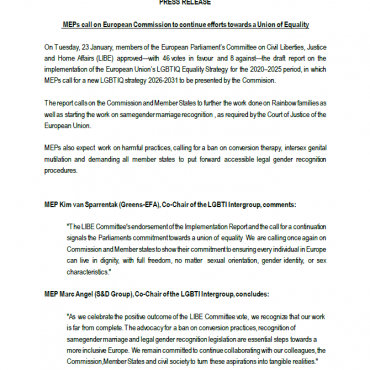Joint press release: Baltic Pride under threat
Joint press release by ILGA-Europe, the Intergroup on LGBT Rights and Amnesty International
Raimondas Petrauskas, Lithuania’s Interim Attorney General, and Stanislovas Buškevičius, member of the Kaunas City Council, have applied to the court to ban the Baltic Pride/March for Equality scheduled for this Saturday, 8 May, which was previously authorised by the Mayor of Vilnius. Their appeal is motivated by concerns over potential security risks. According to Mr Petrauskas, the Attorney General’s office has evidence that protests will be organised by various radical groups seeking to provoke unrest if the March goes ahead.
 The court will deliver a decision on whether to disallow the March for Equality by tomorrow, 5 May, lunch time.
The court will deliver a decision on whether to disallow the March for Equality by tomorrow, 5 May, lunch time.
ILGA-Europe, the European Parliament’s Intergroup on LGBT Rights and Amnesty International are calling on the Lithuanian authorities to ensure that the human right to peaceful assembly is respected and LGBT people in Lithuania are provided with adequate protection in the exercise of this right.
Article 36 of the Lithuanian Constitution states: “Citizens may not be prohibited or hindered from assembling unarmed in peaceful meetings.” Freedom of assembly is a human right which is guaranteed by major international and European human rights instruments which Lithuania has ratified, including: Article 21 of the International Covenant of Civil and Political Rights and Article 11 of the European Convention for the Protection of Human Rights and Fundamental Freedoms.
The established case-law of the European Court of Human Rights on freedom of assembly has been affirmed in relation to LGBT people and the Court said that violating the right of assembly on the grounds of sexual orientation is discriminatory. The Court affirmed that the freedom of expression extends not only to the ideas and views of the majority, but also to those belonging to minorities or those that may cause shock, disagreement and opposition. Moreover, the Court has consistently ruled that if there is a risk of violence from counter-demonstrators, the state has a positive duty to protect demonstrators.
In March 2010, the government of Lithuania approved the Council of Europe’s Recommendations on measures to combat discrimination on grounds of sexual orientation or gender identity. These Recommendations reaffirm the obligation on member states of the Council of Europe to ensure ‘that the right to freedom of peaceful assembly, as enshrined in Article 11 of the Convention, can be effectively enjoyed, without discrimination on grounds of sexual orientation or gender identity.’
Less than a week ago, on 29 April 2010, the Parliamentary Assembly of the Council of Europe Resolution on Discrimination on the basis of sexual orientation and gender identity which calls on the Council of Europe member states to “ensure that the fundamental rights of LGBT people, including freedom of expression and freedom of assembly and association, are respected, in line with international human rights standards”.
Evelyne Paradis, Executive Director of ILGA-Europe, said: “We appeal to the Lithuanian authorities to stand up for democratic values and human rights. The authorities cannot allow themselves to be blackmailed by threats and opposing views to sacrifice basic freedoms guaranteed both by Lithuanian legislations and the country’s international human rights obligations. It is their duty to ensure that its citizens are free to express their views and adequately protected from intimidations and individuals who do not share their opinion.”
Members of the European Parliament Ulrike Lunacek and Michael Cashman promptly reacted: “The Lithuanian authorities should be very careful in their consideration of the Public Prosecutor’s request. They must remember the binding international treaties they signed, including the EU’s Charter on Fundamental Rights, and the European Convention on Human Rights. As a result, they have the legal obligation to protect citizens’ freedom of assembly—including marchers’ safety—, whether they like it or not. The European Parliament will move swiftly and decisively if Lithuania bans a gay pride parade—and we will ensure the European Commission does too.”
John Dalhuisen, Amnesty International’s Expert on Discrimination said: “Any decision to ban the Baltic Pride would be a triumph for prejudice and a victory for those prepared to resort to violence to impose their views. It would be a huge defeat for human rights and the rule of law. Amnesty International is calling on the Lithuanian authorities to honour its obligations and respect the human rights of all its citizens.”
At least four Members of the European Parliament, representatives of the European Commission, politicians from a number of European countries, representatives of ILGA-Europe and Amnesty International will be present in Vilnius during the Baltic pride 2010 this weekend.






